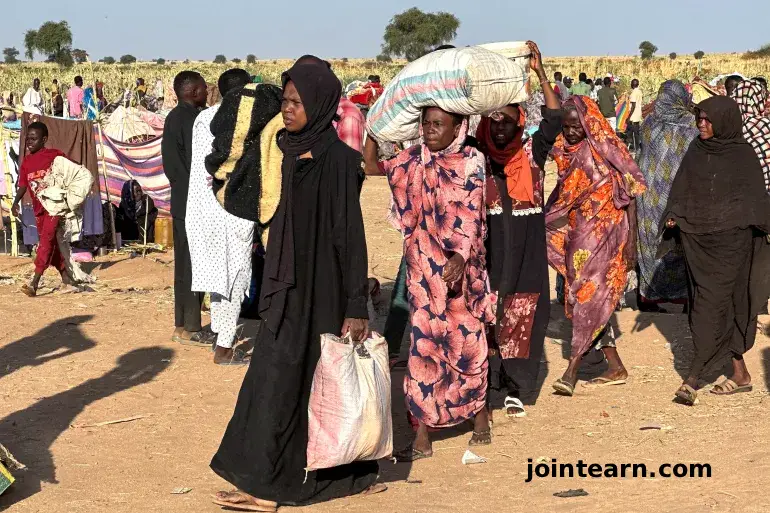
El-Obeid, Sudan — October 31, 2025
The humanitarian situation in Sudan’s North Kordofan state has rapidly worsened, with thousands of civilians fleeing violent Rapid Support Forces (RSF) attacks amid reports of mass killings, abductions, and destruction of villages. According to the Sudan Doctors Network (SDN), more than 4,500 residents have escaped their homes in the Bara locality, seeking safety in the state capital, El-Obeid, and other nearby areas.
RSF Attacks Trigger Mass Displacement in North Kordofan
In a statement released Friday, the Sudan Doctors Network said approximately 2,000 displaced people have successfully reached El-Obeid, located about 60 kilometers (37 miles) south of Bara. Thousands more remain stranded along the route, suffering from acute shortages of food, water, and shelter as they attempt to flee the escalating violence.
“North Kordofan is facing a rapidly deteriorating security situation,” the group warned, highlighting “continued violations” committed by the RSF against civilians.
The RSF, a powerful paramilitary group born out of the former Janjaweed militias of the Darfur conflict, recaptured Bara last week after intense fighting with the Sudanese Armed Forces (SAF). The town has changed hands multiple times since mid-2023, serving as a critical front line between the warring factions.
In July, the RSF raided and burned several villages across North Kordofan, killing nearly 300 civilians, including women and children. Survivors described the attacks as “systematic and merciless,” with entire communities wiped out.
El-Fasher Atrocities Raise Fears of Wider Massacres
The renewed violence in North Kordofan comes just days after the fall of El-Fasher, the capital of neighboring North Darfur, to the RSF. Human rights monitors and local witnesses report that more than 1,500 people were killed during the RSF’s assault on the city.
Verified footage obtained by Al Jazeera shows RSF fighters standing over rows of executed men and piles of civilian bodies in the streets. Survivors recount horrifying scenes of children being killed before their parents.
“The RSF’s actions in El-Fasher show a complete disregard for international law,” said a humanitarian source working with displaced families. “If the world remains silent, North Kordofan will face the same fate.”
The United Nations has warned that the El-Fasher massacre marks a dangerous new phase of Sudan’s two-year civil war, which erupted in April 2023 between the RSF, led by Mohamed Hamdan Dagalo (Hemedti), and the SAF, under General Abdel Fattah al-Burhan.
Experts Warn of Escalating Conflict
Bakry Eljack, a Sudan and South Sudan expert at Long Island University Brooklyn, told Al Jazeera that the RSF has become “increasingly uncontrollable” and that internal investigations promised by Hemedti are unlikely to curb further atrocities.
“The RSF has been out of control for months,” Eljack said. “If the international community does not intervene, the violence seen in El-Fasher will spread into North Kordofan and beyond.”
Hemedti announced this week that an internal inquiry would be launched into alleged RSF “violations,” though observers have dismissed the move as a public relations gesture with no accountability.
The Broader Humanitarian Catastrophe
Sudan’s civil war has plunged the country into one of the world’s largest humanitarian crises. Since fighting began in 2023, over 12 million people have been displaced — nearly a quarter of the population — while tens of thousands have been killed.
Food shortages, mass displacement, and targeted attacks on medical facilities have crippled humanitarian operations. The United Nations Office for the Coordination of Humanitarian Affairs (OCHA) says aid convoys continue to face obstruction from both warring factions, leaving millions without assistance.
At an emergency UN Security Council session on Thursday, Martha Pobee, the UN’s Assistant Secretary-General for Africa, said the fall of El-Fasher represents “a significant shift in the security dynamics” and warned that the territorial scope of the conflict is broadening into new regions, including North Kordofan.
“We are witnessing an expansion of violence that could engulf central Sudan,” Pobee told the Council. “Without urgent action, millions more could face displacement or death.”
Civilians Trapped Between Warring Factions
Residents of North Kordofan say they feel abandoned. Many who fled the fighting describe being targeted by both sides — RSF fighters accused of looting and executing civilians, and SAF soldiers accused of shelling residential areas indiscriminately.
One displaced teacher from Bara told local media that her family walked for two days to reach El-Obeid. “We saw corpses on the road. People are dying of hunger and thirst,” she said.
International aid organizations, including Doctors Without Borders (MSF) and Save the Children, have called for humanitarian corridors to allow civilians safe passage out of conflict zones. However, the closure of major roads and continued airstrikes have made large-scale evacuations nearly impossible.
The Road Ahead: A Nation on the Brink
Sudan’s fragile peace talks, once supported by regional mediators in Saudi Arabia and the African Union, remain stalled. Analysts warn that the RSF’s growing dominance across western and central Sudan could fracture the country permanently, deepening ethnic and political divides.
“Every week, another province falls to the RSF,” said Dr. Amira Abdallah, a Sudanese conflict analyst. “Without a unified international response, Sudan risks total state collapse.”
As North Kordofan braces for further violence, thousands more continue to flee southward, joining the millions already displaced across Sudan and neighboring Chad, South Sudan, and Egypt. For many, hope is fading fast.


Leave a Reply